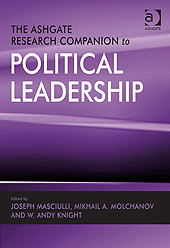The Ashgate Research Companion to Political Leadership
Edited by : Joseph Masciulli, St Thomas University, Canada
Release date: Jan 2009
Ashgate
Number of pages: 588
ISBN: 978-0-7546-7182-4


Discussing the major theories of political leadership with a focus on contemporary challenges that political leaders face worldwide, this research companion provides a comprehensive and up-to-date resource for an international readership. The editors combine empirical and normative approaches to emphasize the centrality of political culture, as well as the limits of culture and the universal demands of innovative adaptation.
The volume examines:
• classical and contemporary theories of political leadership
• great leadership, both national and international
• politically influential religions and religious-political leadership
• social movements' leadership
• tensions between political leadership and other forms of leadership (e.g. judicial, corporate)
• postmodern and feminist challenges to traditional notions of political leadership
Above all, this volume is a guide for further research in political leadership theories, comparative case studies of political leadership, and the clarification of future contexts for political leadership.
Contents: Preface; Part I Introduction: Political leadership in context, Joesph Masciulli, Mikhail A. Molchanov and W. Andy Knight. Part II Classical Theories of Political Leadership: Political leadership and the problem of principle: a classical response to postmodernism, Richard Myers; Prudence and glory: Machiavelli on political leadership, Christine Cornell and Patrick Malcolmson. Part III Contemporary Theories of Political Leadership: Conceptions of global leadership for contextually intelligent, innovatively adaptive political leaders, Joseph Masciulli and W. Andy Knight; Heidegger's Führerprinzip: leadership out of and into nihilism, Edward Grant Andrew; Distinguishing and unifying visionary leadership and mechanical management, W. Andy Knight; Feminist approaches to the study of political leadership, Laura Sjoberg. Part IV Studies of National Political Leadership: American civil-military relations and political leadership, Geoffrey S. Corn and Eric Talbot Jensen; Presidential leadership in times of war, Amanda DiPaolo; The gendered nature of leadership analysis: lessons from women leaders as executives in Anglo-American systems, Patricia Lee Sykes; Generational change in Chinese political leadership, Hairong Lai; Political leadership in China in the 21st century, Weixing Chen; Elites and leadership in Russian politics, Oxana Gaman-Golutvina; Islam/Muslims and political leadership, Mojtaba Mahdavi. Part V Studies of International Organization and Global Issues Leadership: Leadership in the European Union: assessing the significance of the trio council presidency, Colette Mazzucelli; International human rights, political leadership and the problem of normative change in the international system, Shaun Narine; Leading the leaders: the environmental advocacy of NGOs, Barbara MacKinnon, Kenneth H. Maybee, Mikhail A. Molchanov and Eddie Oldfield. Part VI Studies of Political Leadership and Society: Courts and the paradox of political leadership, Thomas M.J. Bateman; The war on terror: war or metaphor?, Jeffrey F. Addicott; Leaders, followers and political scientists, Hugh Donald Forbes; A political economic analysis of women's political leadership, Louise Carbert. Part VII The Future of Political Leadership: The future of political leadership: uncertain and dangerous contexts, Joseph Masciulli; Bibliography; Index.











